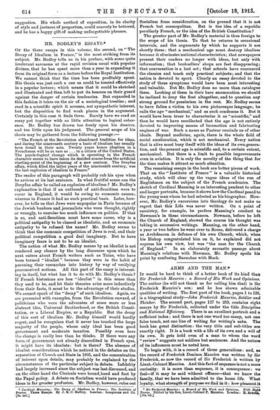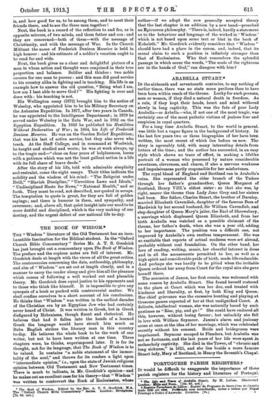ARMS AND THE MAN.* IT would be hard to think
of a better book of its kind than Sir Frederick Maurice : a Record of His Work and Opinions. The author (he will not thank us for calling him that) is Sir Frederick Maurice's son: and he has shown admirable qualities of writing. The first part of the book, pages 1 to 126, is a biographical study—John Frederick Maurice, Soldier and Thinker. The second part, pages 127 to 283, contains eight essays by Sir Frederick, collected under the title Discipline and National Efficiency. There is an excellent portrait and a sufficient index : and there is not one word too many, not one false touch, not one line of writing for writing's sake. The book has great distinction : the very title and sub-titles are exactly right. It is a book with a life of its own and a will of its own. It gets hold even of a man to whom the word " review " suggests not soldiers but sentences. And the nature of its influences must be noted here.
To begin with, it is a record of three generations : and, as the record of Frederick Denison Maurice was written by Sir Frederick, so now the record of Sir Frederick is written by Lieut.-Colonel Maurice. And this fact of sequence is not a mere curiosity: it is more than sequence, it is consequence : 179 feel—if it may be said without offence—that we know the family, that we have been admitted to the home life. What loyalty, what strength of purpose we find in it : how pleasant it Sir Frederick Maurice: a Record of His Work and Opinions. Withe.h.t Essays. Edited by his Son, -Lieut..Colonel F, Maurice. London E, ArnM,
DOB. 6(1.1 .
is, and how good for us, to be among them, and to meet their friends there, and to see the three men together !
Next, the book is a record of the reflection to and fro, as in opposite mirrors, cf two minds, and them father and son : and they are concerned—both of them—with the message of Christianity, and with the message of War. In the Church Militant the name of Frederick Denison Maurice is held in high honour : and his estimate of a soldier's vocation ought to be read far and wide.
Next, the book gives us a clear and delightful picture of a man in whom action and thought were conjoined in their true proportion and balance. Soldier and thinker : two noble careers for one man to pursue : and this man did good service to his country alike in fighting and in teaching. His life is an example bow to answer the old question, "Being what I am, how am I best able to serve God ? " His fighting is over and dove with : his teaching is not.
His Wellington essay (1872) brought him to the notice of Wolseley, who appointed him to be his Military Secretary on the Ashantee Expedition. In 1877, after two years in Canada, he was appointed to the Intelligence Department ; in 1879 he served under Wolseley in the Zulu War, and in 1882 on the Egyptian Expedition. In 1883 he published his Hostilities Without Declaration of War ; in 1884, his Life of Frederick Denison Maurice. He was on the Gordon Relief Expedition; that was his last of active service, but they also serve who teach. At the Staff College, and in command at Woolwich, he taught and studied and wrote; he was at work always, up to the tragic end—" close on four years of helplessness, borne with a patience which was not the least gallant action in a life with its full share of brave deeds."
After the story of his life, told with admirable simplicity and restraint, come the eight essays. Their titles indicate the nobility and the wisdom of his mind : "The Zeitgeist under, Drill," "Slavish Discipline," "Unwritten Laws and Ideals," "Undisciplined Haste for News," "National Health," and so forth. They must be read, not described, nor quoted in scraps. The temptation to quote is great, for they are full of golden sayings; and there is humour in them, and sympathy, and reverence; and, above all, that quiet insight into our need to be more dutiful and disciplined, which is the very making of our destiny, and the urgent defect of our national life to-day.















































 Previous page
Previous page